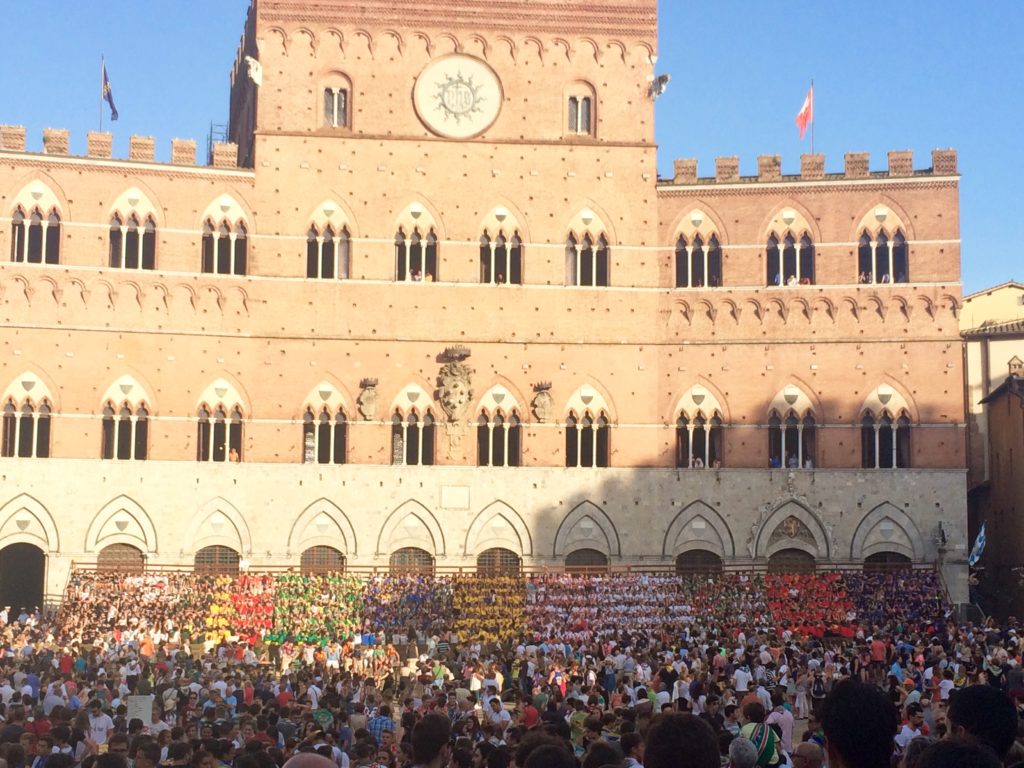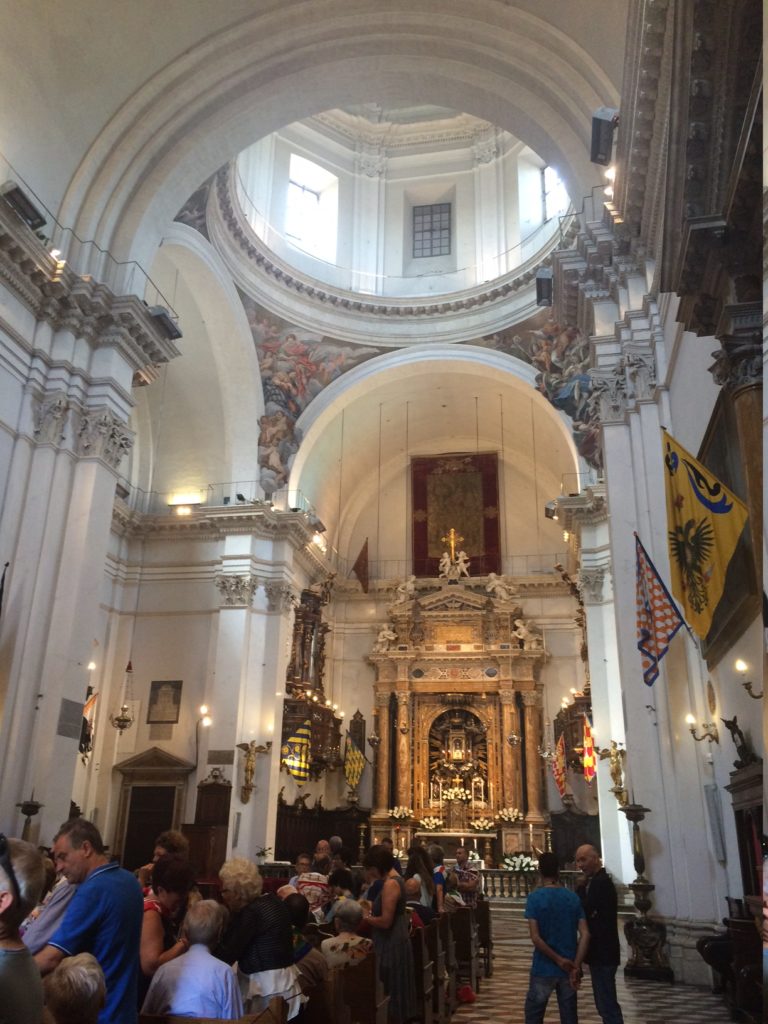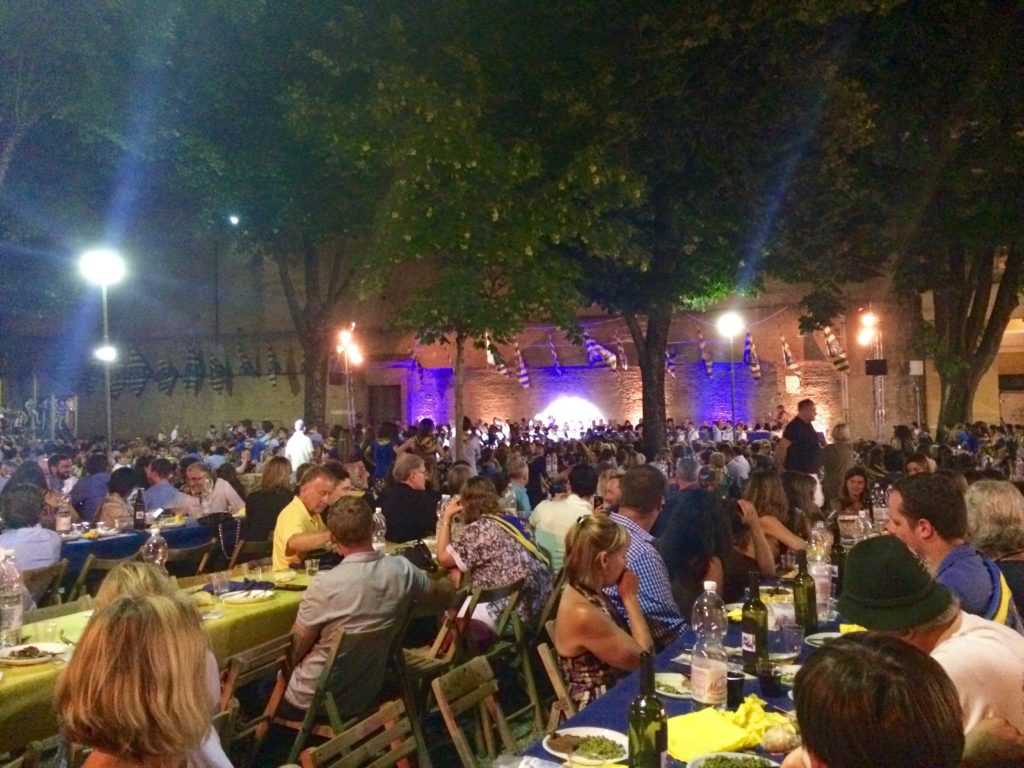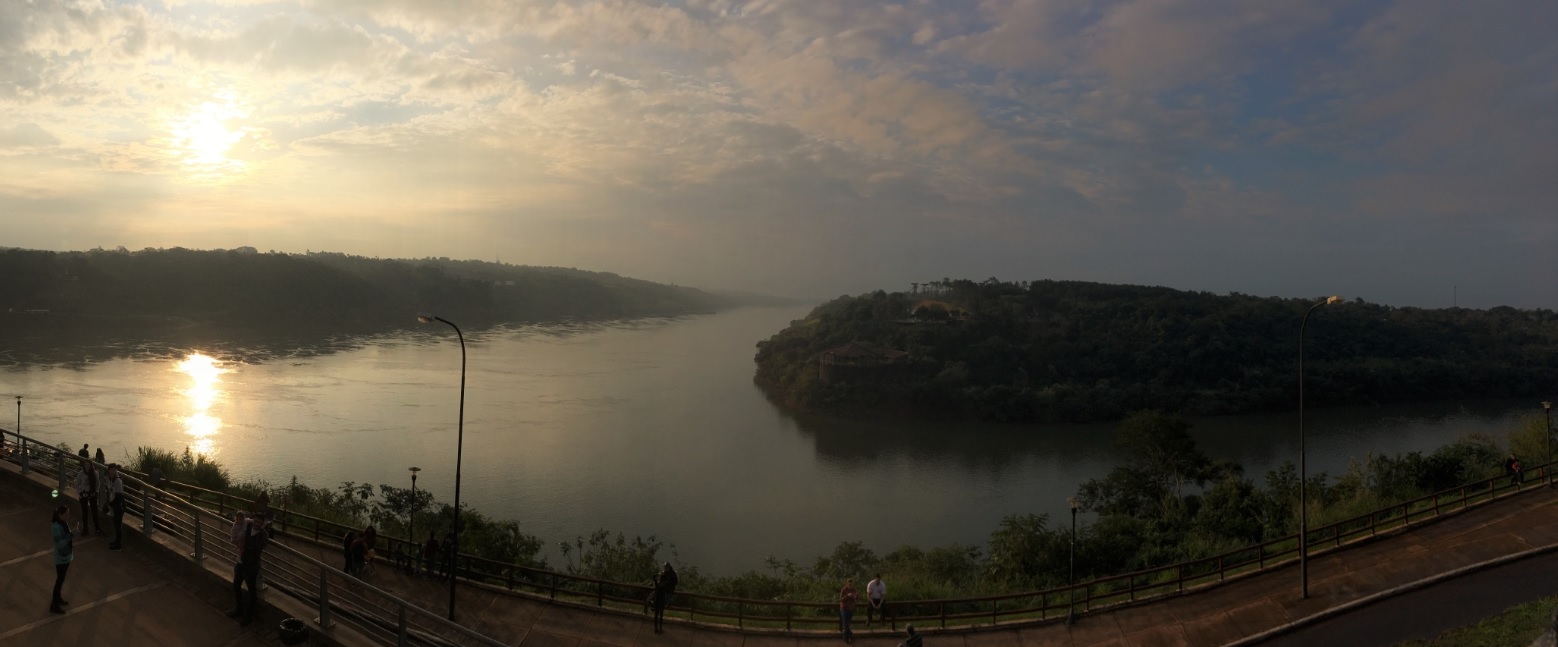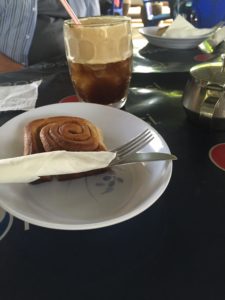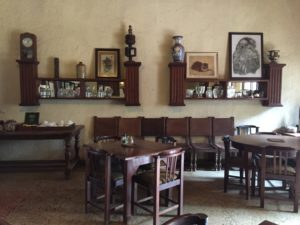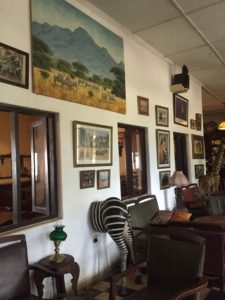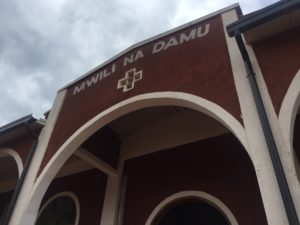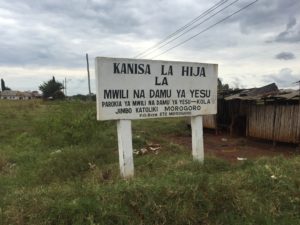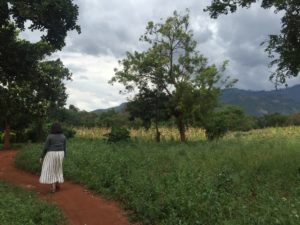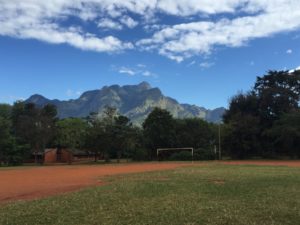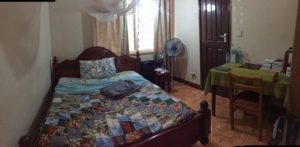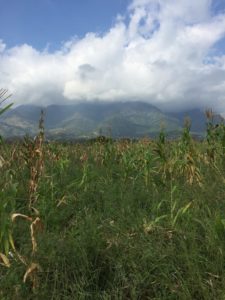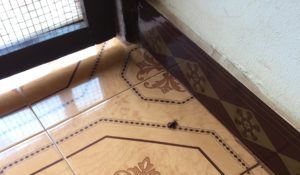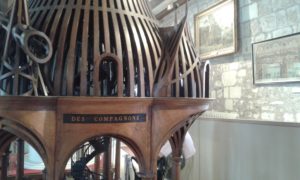My apologies for not writing last week! It was a busy week here in Siena, more tourists came to the town and the locals were bustling with excitement and anxiety, all because of the Palio–the biggest event in the town. I consider myself very lucky that I was able to be in the city while this great event unfolded. I got the opportunity to not only watch the race from the middle of the piazza, but also take part in the events leading to the race. The school of Dante Alighieri organized a group led by one of the instructors to go to the various events.
A little bit about the Palio: it’s an annual horse race unique to the town of Siena, which happens twice a year (one on 2 July, and another one on 16 August). If you ask a Sienese person, whether he or she is young or old, they’ll tell you that the Palio is more than just a race, it’s a huge part of their lives here in Siena. It’s been around for about 400 years, and it involves the entire town. The town of Siena is divided into 17 “contrada” or neighbourhoods, and everyone would grow up with their contrada. When asking a local if they were from Siena, most, if not all of them, would answer proudly that they were born and raised in their contrada. Every Palio, 10 contrada would take part in the race. They race to win the “drappellone”, or the Palio banner, which is made by a local artist, and depicts an image of the Madonna. (And also pride and bragging rights, I suppose). The race itself is only one day long, but the ceremonies and events leading to the race start three days before that, and the preparations for the race is all year long. The race takes place in the main piazza of the town, Piazza del Campo.
The first event that I attended was the assignation of the horses for each contrada at the Piazza del Campo. Earlier that day, 30 horses ran around the piazza, and the captains of the 10 contrada picked 10 horses. Then those 10 horses were assigned randomly to each contrada. That afternoon, thousands of Sienese people gathered in the piazza to see which of the ten horses would be their horse for the Palio. They marched in as a group, and left proudly chanting their contrada song with their horse. It was fascinating watching the reaction of the people from the contrada upon hearing which horses they got, whether it was one of the better horses, or one of the inexperienced ones.
The next event I attended was one of the trial runs for the race. It was held on a Thursday evening at the piazza. The horses and their jockeys got the chance to try out the “track” for a couple times from Wednesday to Sunday, doing the full three laps around the piazza. These trial runs were almost as well-attended as the Palio race itself. About an hour before the start of the trial run, the people of the contrada would march into the piazza while chanting their contrada song, with their horse leading the “procession.” The horse is the star of the weekend–they get the best treatment, and are guarded by a “barbaresco”, a man who was assigned by the contrada to take care of the horse. This man would stay with the horse the entire time, even sleeping with the horse, to prevent it from being “sabotaged” or harmed by anyone or anything. Watching the trial run was like watching a sneak peak of the Palio, although a lot of the horses and jockeys did not run as fast, merely trying out the course of the race.
On Friday afternoon, I went with a group of students to the Blessing of the drappellone at the Basilica della Santa Maria in Provenzano. The whole Palio race is dedicated to the Madonna, who is the patron of Siena. In July, the whole celebration of Palio is done at the Basilica in Provenzano, while in August, it’s done in the Duomo. So that afternoon, hundreds of people went down to Provenzano to get a closer look at the drappellone, which depicts the Virgin Mary, the emblem of the contradas, and interesting creatures which look like a mix of horses and men. At the top of the drappellone, the words “Divinae Misericordiae” was inscribed, as this Palio is dedicated to the Jubilee year of Mercy. (For a peak of the banner, go to this link: http://www.ilpalio.org/drappellone2.7.2016.htm)
The most interesting event, however, was the contrada dinner that Friday evening. I got the chance to join the contrada of Tartuca (tortoise!) for their huge dinner on the evening before the day of the Palio. There were hundreds of people (or maybe close to a thousand!) from young to old, attending the dinner, and the night was filled with camaraderie. The food itself was really great, a full five course Italian dinner from antipasto to dessert, cooked by the women of the contrada. During the dinner, the captain, the jockey, and the head of the contrada gave a speech for the people. It was amazing, the community spirit and pride they have as a contrada.
Saturday was the day of the Palio! In the afternoon before the race, all the contrada people flocked down to their contrada church for the Blessing of the Horse event. It was a solemn event led by the contrada priest. I attended the blessing of the horse of the Draco contrada, which was held at a garden in front of the church of San Domenico. The people of the contrada arrived together as a group, led by young men of the contrada marching with drums and flags wearing medieval costumes. They entered their church and said some prayers, and then moved into the garden forming a circle around the center of the garden. Their horse then marched in with the jockey. The priest said a short blessing for the jockey and the horse, and then the horse was taken back to the stable to wait for the race. It was a relatively short event, but the atmosphere was full of tension. You can sense the anxiety of the people from the contrada, their determination to win the Palio.
After the blessing of the horse, it was finally time for the race. Hundreds of thousands of people gathered in the piazza to watch the race. An hour before the race, the young men of the contradas entered the piazza in a very fascinating procession with drums and their contrada flags, waving and throwing the flags up in the air as they marched with pride representing their contrada. Then the Palio banner arrived in the piazza, carried in a giant carriage around the piazza. Soon after that, the horses and the jockeys entered the course. The crowd went completely and eerily silent as the official of the city read out the order of the horses at the starting line (again, the orders are determined randomly) from the inner side of the course, to the outermost side. It took awhile from the announcement to the start of the race, as some of the horses grew anxious with the crowd. Finally, a bang was sounded to announce the start of the race. The crowd went crazy, yelling and cheering loudly for their contrada. One of the contrada, Nicchio (the Shell contrada) was leading for the first two laps, but at the last lap, suddenly the horse from the Lupa contrada (the Wolf contrada) caught up and took over the lead to the finish line. As the horses went past the finish line, the people from Lupa started pouring out into the race course, running towards the horse and the jockey. I watched on TV a glimpse of their celebration at the Basilica in Provenzano after the Palio race, where they gave thanks and chanted the Tedeum to the Virgin Mary.
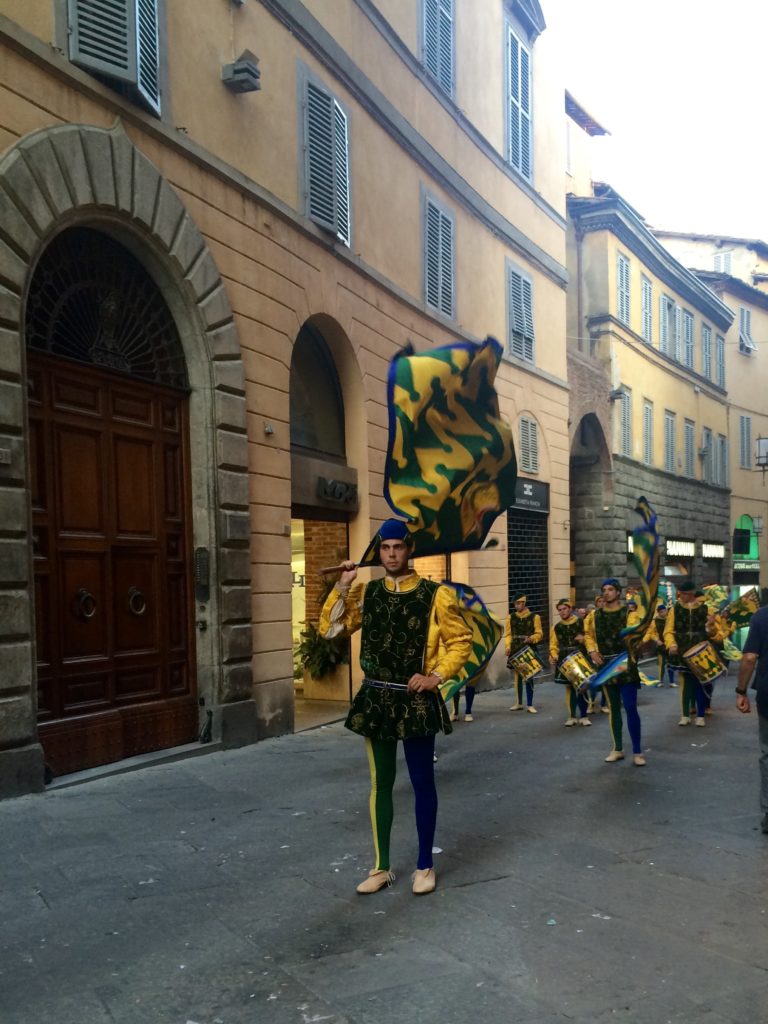
The people from the Bruco contrada (caterpillar!) marching with their flags, drums and medieval costume
The whole weekend was so eventful and exciting, and I learnt a lot of things about the people of Siena as I went to the series of events leading up to the Palio on Saturday. I was a little overwhelmed by the big crowds that flooded the town, but the experience of being in the town during the Palio was one that I will always cherish and remember. I was able to witness the people’s passion, their sense of belonging and pride to their contrada, their fierce determination, and their strong ties to their traditions.
It was a really great week!
